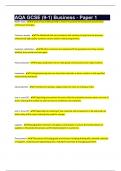Jessybrown
On this page, you find all documents, package deals, and flashcards offered by seller jessybrown.
- 2350
- 0
- 36
Community
- Followers
- Following
2386 items

AQA GCSE Chemistry
AQA A level Chemistry Revision Questions and Answers
- Package deal
- • 15 items •
- Types of structure: Bonding structure and the properties of matter: Chemistry: GCSE (9:1) • Exam (elaborations)
- Transition elements: Atomic structure and the periodic table: Chemistry: GCSE (9:1) • Exam (elaborations)
- Separating techniques: Atomic structure and the periodic table: Chemstry: GCSE (9:1) • Exam (elaborations)
- Reaction profile diagrams: Energy Changes: Chemistry: GCSE (9:1) • Exam (elaborations)
- Naming Chemicals: Atomic structure and the periodic table: Chemstry: GCSE (9:1) • Exam (elaborations)
- And more ….
AQA A level Chemistry Revision Questions and Answers

AQA GCSE Biology
AQA A level Biology Revision Questions and Answers
- Package deal
- • 14 items •
- GCSE AQA Biology- The Eye • Exam (elaborations)
- Foundation AQA Biology Paper • Exam (elaborations)
- Foundation AQA Biology Paper 1 • Exam (elaborations)
- AQA GCSE Triple Science - Biology • Exam (elaborations)
- AQA GCSE Biology - Paper 1 EXAM (2024) • Exam (elaborations)
- And more ….
AQA A level Biology Revision Questions and Answers

7. AQA GCSE Biology: Ecology
Ecosystem - The interaction of a community of living organisms with the non-living parts of their environment What is a community made up of? - The populations of different species or organisms that are all interdependent in a habitat Habitat - The environment in which an organism lives Population - The total number of organisms of the same species living in the same geographical area Interdependence - The way in which each species within a community depends on other species for food, sh...
- Exam (elaborations)
- • 15 pages •
Ecosystem - The interaction of a community of living organisms with the non-living parts of their environment What is a community made up of? - The populations of different species or organisms that are all interdependent in a habitat Habitat - The environment in which an organism lives Population - The total number of organisms of the same species living in the same geographical area Interdependence - The way in which each species within a community depends on other species for food, sh...

All of AQA GCSE Biology (9-1) - Paper 1
What are the two types of microscopes? - Light Microscope Electron Microscope What is the magnifying power of a light microscope? - x 2,000 What is the magnifying power of an electron microscope? - x 2,000,000 What is the resolving power? - The ability to distinguish between two separate points What is the resolving power of light microscopes? - 200 nm What is the resolving power of electron microscopes? - 0.2 nm What are the advantages of light microscopes? - 1. living samples 2. can vi...
- Package deal
- Exam (elaborations)
- • 35 pages •
What are the two types of microscopes? - Light Microscope Electron Microscope What is the magnifying power of a light microscope? - x 2,000 What is the magnifying power of an electron microscope? - x 2,000,000 What is the resolving power? - The ability to distinguish between two separate points What is the resolving power of light microscopes? - 200 nm What is the resolving power of electron microscopes? - 0.2 nm What are the advantages of light microscopes? - 1. living samples 2. can vi...

AQA-GCSE Biology Topic 6 exams already passed
What are chromosomes? - They are really long molecules of DNA What does DNA stand for - DeoxyribonNucleicAcid. It is a complex chemical in a thread-like chain. It contains coded information and genetic information Where is DNA found - It is found in the nucleus of animal and plant cells in long structures called chromosomes. Chromosomes normally come in pairs What is DNA structure called - It is a polymer. It is made up of two strands coiled together in the shape of a double helix. What i...
- Package deal
- Exam (elaborations)
- • 13 pages •
What are chromosomes? - They are really long molecules of DNA What does DNA stand for - DeoxyribonNucleicAcid. It is a complex chemical in a thread-like chain. It contains coded information and genetic information Where is DNA found - It is found in the nucleus of animal and plant cells in long structures called chromosomes. Chromosomes normally come in pairs What is DNA structure called - It is a polymer. It is made up of two strands coiled together in the shape of a double helix. What i...

AQA A level Biology Revision Questions
Describe how you would use a biochemical test to show that a solution contained a non-reducing sugar, such as sucrose. [3] - ,first reducing sugars test; boil with dilute HCl acid then Neutralise with NaHCǑ, add benedict and heat to 95 degrees C brick red ppt forms if reducing sugar is present Describe a chemical test you could carry out to show that a piece of coconut contains lipids. [3] - (Crush in) ethanol / alcohol; Add (to) water (Order of adding is critical for this point); Emulsion...
- Package deal
- Exam (elaborations)
- • 82 pages •
Describe how you would use a biochemical test to show that a solution contained a non-reducing sugar, such as sucrose. [3] - ,first reducing sugars test; boil with dilute HCl acid then Neutralise with NaHCǑ, add benedict and heat to 95 degrees C brick red ppt forms if reducing sugar is present Describe a chemical test you could carry out to show that a piece of coconut contains lipids. [3] - (Crush in) ethanol / alcohol; Add (to) water (Order of adding is critical for this point); Emulsion...

AQA A-level Biology paper 1
large molecules often contain carbon. why? - they can readily form bonds with other carbon atoms. this forms a 'backbone'. other atoms can then attach. describe benedicts test for reducing sugars - add equal volumes of the sugar sample and benedicts reagent. heat the mixture in a water bath for 5 minutes. brick red precipitate will form. what is a reducing sugar? - a sugar that can reduce (give electrons to) another chemical. describe the benedicts test for non reducing sugars - with fo...
- Package deal
- Exam (elaborations)
- • 23 pages •
large molecules often contain carbon. why? - they can readily form bonds with other carbon atoms. this forms a 'backbone'. other atoms can then attach. describe benedicts test for reducing sugars - add equal volumes of the sugar sample and benedicts reagent. heat the mixture in a water bath for 5 minutes. brick red precipitate will form. what is a reducing sugar? - a sugar that can reduce (give electrons to) another chemical. describe the benedicts test for non reducing sugars - with fo...

AQA biology a-level paper 2
describe and explain the steps in the light dependent reaction of photosynthesis - 1. photoionisation: light reaches chlorophyll in PSII, which is absorbed by an electron, which becomes excited and moves to a higher energy level. 2. the electron passes to a carrier protein in the thylakoid membrane, and is passed down a series of carrier molecules called an electron transfer chain. 3. as the electron moves down, energy is lost from the electron and is released as ATP. 4. the loss of electr...
- Package deal
- Exam (elaborations)
- • 20 pages •
describe and explain the steps in the light dependent reaction of photosynthesis - 1. photoionisation: light reaches chlorophyll in PSII, which is absorbed by an electron, which becomes excited and moves to a higher energy level. 2. the electron passes to a carrier protein in the thylakoid membrane, and is passed down a series of carrier molecules called an electron transfer chain. 3. as the electron moves down, energy is lost from the electron and is released as ATP. 4. the loss of electr...

AQA GCSE (9-1) Business - Paper 1
Buffer stock - A stock of raw materials held in reserve to protect the production process from unforeseen shortages. Customer loyalty - The likelihood that past customers will continue to buy from the business, enhanced by high quality customer service and/or reward programmes. Customer satisfaction - Whether customers are pleased with the goods/services they receive; whether they would purchase again. Flow production - Using a production line to make goods continuously and in large number...
- Exam (elaborations)
- • 5 pages •
Buffer stock - A stock of raw materials held in reserve to protect the production process from unforeseen shortages. Customer loyalty - The likelihood that past customers will continue to buy from the business, enhanced by high quality customer service and/or reward programmes. Customer satisfaction - Whether customers are pleased with the goods/services they receive; whether they would purchase again. Flow production - Using a production line to make goods continuously and in large number...

AQA GCSE Biology B1
What are cells? - The building blocks of organisms Define eukaryotic cell - Cells that have a true nucleus Define prokaryotic cell - Cells that do not have a true nucleus What is in an animal cell? - Nucleus, cytoplasm, cell membrane, mitochondria, ribosomes What is in a plant cell? - Same as animal plus: vacuole, chloroplasts, chlorophyll, cell wall What is in a yeast cell? - Same as animal plus: temporary vacuole, cell wall What is in a bacterial cell? - Cytoplasm, cell membrane, cell wa...
- Package deal
- Exam (elaborations)
- • 6 pages •
What are cells? - The building blocks of organisms Define eukaryotic cell - Cells that have a true nucleus Define prokaryotic cell - Cells that do not have a true nucleus What is in an animal cell? - Nucleus, cytoplasm, cell membrane, mitochondria, ribosomes What is in a plant cell? - Same as animal plus: vacuole, chloroplasts, chlorophyll, cell wall What is in a yeast cell? - Same as animal plus: temporary vacuole, cell wall What is in a bacterial cell? - Cytoplasm, cell membrane, cell wa...
